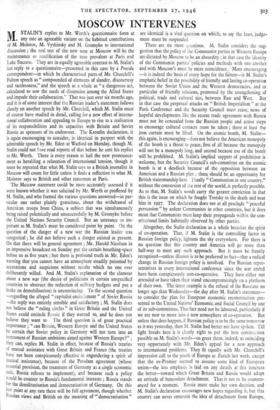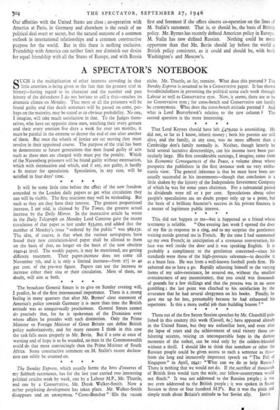MOSCOW INTERVENES
MSTALIN'S replies to Mr. Werth's questionnaire form at . any rate an agreeable variant on the habitual contributions of M. Molotov, M. Vyshinsky and M. Gromyko to international discussion ; the real test of the new tone at Moscow will be the maintenance or modification of the tone prevalent at Paris and Lake Success. They are in equally agreeable contrast to M. Stalin's last reply to a questionnaire—presented in this case by a Pravda correspondent—in which he characterised parts of Mr. Churchill's Fulton speech as " compounded of elements of slander, discourtesy and tactlessness," and the speech as a whole as " a dangerous act, calculated to sow the seeds of dissension among the Allied States and impede their collaboration." That was just over six months ago, and it is of some interest that the Russian leader's statement follows closely on another speech by Mr. Churchill, which M. Stalin must of course have studied in detail, calling for a new effort of interna- tional collaboration and appealing to Europe to -rise to a realisation of its responsibilities and its capacities with Britain and Soviet Russia as sponsors of its endeavour. The Kremlin declaration, it is again encouraging to consider, is identical in purport with the admirable speech by Mr. Eden at Watford on Monday, though M. Stalin could not have read reports of that before he sent his replies to Mr. Werth. There is every reason to hail the new pronounce- ment as heralding a relaxation of international though it must be repeated that what M. Stalin says to a British journalist in Moscow will count for little unless it finds a reflection in what M. Molotov says to British and other statesmen at Paris.
The Moscow statement could be more accurately assessed if it were known whether it was solicited by Mr. Werth or proffered by M. Stalin, and who framed the various questions answered—in par- ticular one rather plainly gratuitous, about the withdrawal of American troops from China, a subject that was simultaneously being raised polemically and unsuccessfully by M. Gromyko before the United Nations Security Council. But an utterance so im= portant as M. Stalin's must be considered point by point. On the question of the danger of a new war the Russian leader was categorical ; he did not believe such a danger existed at present. On that there will be general agreement ; Mr. Harold Nicolson in an impressive broadcast on Sunday put the certain breathing-space before us as five years ; but there is profound truth in Mr. Eden's warning that you cannot have an atmosphere steadily poisoned by accusations and suspicions without results which no one ever deliberately willed. And M. Stalin's explanation of the clamour about a new war (the desire of politicians in certain unspecified countries to obstruct the reduction of military budgets and put a brake on demobilisation) is unconvincing. To the second question —regarding the alleged " capitalist encirclement " of Soviet Russia —the reply was entirely sensible and satisfactory ; M. Stalin does not believe the " ruling circles in Great Britain and the United States could encircle Russia if they wanted to, and he does not believe they want to. The third question is of great practical importance ; " can Britain, Western Europe and the United States be certain that Soviet policy in Germany will not turn into an instrument of Russian ambitions aimed against Western Europe?" ; they can, replies M. Stalin in effect, because of Russia's treaties of mutual assistance with Great Britain and France (the treaties have not been conspicuously effective in engendering a spirit of mutual assistance), because of the Potsdam agreement (whose essential provision, the treatment of Germany as a single economic unit, Russia refuses to implement), and because such a policy would be counter to Russia's fundamental interests ; Russia stands for the demilitarisation and democratisation of Germany. On this last point at any rate there will be full agreement, though whether Russian views and British on the meaning of " democratisation " are identical is a vital question on which, to say the least, judge- ment must be suspended.
There are six more questions. M. Stalin considers the sug- gestion that the policy of the Communist parties in Western Europe are dictated by Moscow to be an absurdity ; in that case the identity of the Communist parties' policies and methods with one another and with Moscow's must be mere coincidence.' ti More encouraging it is indeed the basis of every hope for the future—is M. Stalin's emphatic belief in the possibility of friendly and lasting co-operation between the Soviet Union and the Western democracies, and in particular of friendly relations, promoted by the strengthening of political, trade and cultural ties, between East and West. But in that case the perpetual attacks on " British Imperialism " at the Paris Conference and the Security Council must cease, news of hopeful developments like the recent trade agreement with Russia must not be concealed from the Russian people and active steps to encourage cultural contacts must be taken ; there at least the iron curtain must be lifted. On the atomic bomb, M. Stalin— this again, is encouraging—does not believe the American monopoly of the bomb is a threat to peace, first of all because the monopoly will not be a monopoly long, and second because use of the bomb will be prohibited. M. Stalin's implied support of prohibition is welcome, but the Security Council's sub-committee on the atomic bomb is at a deadlock because of the opposition between an American and a Russian plan ; there should be an opportunity for British statesmanship here. Finally " Communism in one country," without the conversion of the rest of the world, is perfectly possible. As to that, M. Stalin's words carry the greater conviction in that this is the issue on which he fought Trotsky to the death and beat him in 1927. The declaration does not at all preclude " peaceful persuasion " by ardent Communists in other countries, but it does mean that Communists must keep their propaganda within the con- stitutional limits habitually observed by other parties.
Altogether, the Stalin declaration as a whole breathes the spirit of co-operation. That, if M. Stalin' is the controlling factor in Russian foreign policy, lightens the sky everywhere. For there is no question that this country and America will go more than half-way to meet any such approach. But it must be frankly recognised—unless illusion is to be preferred to fact—that a radical change in Russian foreign policy is involved. For Russian repre- sentatives in every international conference since the war ended have been conspicuously non-co-operative. They have either not attended or have taken their stand uncompromisingly on a platform of their own. The latest example is the refusal of the Russians no longer ago than Wednesday—the day after M. Stalin's statement— to consider the plan for European economic reconstruction pre- sented to the United Nations' Economic, and Social Council by one of its sub-committees. That fact need not be laboured, particularly if we are now to move into a new atmosphere of co-operation. But unless that does happen, if Russian policy is to be the same tomorrow as it was yesterday, then M. Stalin had better not have spoken. Till light breaks here it is clearly right to put the best construction possible on M. Stalin's words—to greet them, indeed, as coinciding very opportunely with Mr. Eden's appeal for a new approach to international problems. They fit equally with Mr. Churchill's impressive call to the youth of Europe at Zurich last week, except that the ex-Premier seemed to assume some kind of European union—the less emphasis is laid on any details at this juncture the better—toward which Great Britain and Russia would adopt an attitude of benevolent detachment. That is not to be counten- anced for a moment. Russia must make her own decision, and M. Stalin's declaration encourages new hopes -regarding it, but this country can never entertain the idea of detachment from Europe., Our affinities with the United States are close ; co-operation with America at Paris, in Germany and elsewhere is the result of no political deal overt or secret, but the natural outcome of a common outlook in international relationships and a common constructive purpose for the world. But in this there is nothing exclusive. Friendship with America can neither limit nor diminish our desire for equal friendship with all the States of Europe, and with Russia first and foremost if she offers sincere co-operation on the lines of M. Stalin's statement. That is, or should be, the basis of British policy. Mr. Byrnes has recently defined American policy in Europe. M. Stalin has now defined Russian. Nothing could be more opportune than that Mr_ Bevin should lay before the world a British policy consistent, as it could and should be, with both Washington's and Moscow's.



























 Previous page
Previous page